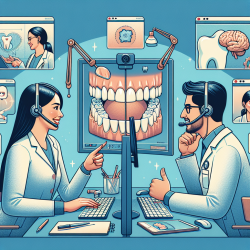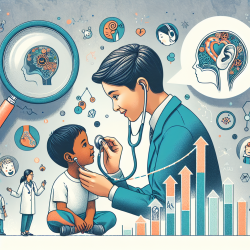Introduction
Providing dental care to individuals with intellectual and developmental disabilities (IDD) presents unique challenges. Many dental professionals report feeling unprepared to effectively manage the behavioral difficulties that can arise during dental exams. A recent study titled "Remote Training of Dental Students and Professionals to Promote Cooperative Behavior in Patients with Intellectual and Developmental Disabilities" offers promising solutions through remote training methodologies.
Understanding the Study
The study explored the effectiveness of remote behavioral skills training (BST) for dental students and professionals. This training focused on implementing interventions such as tell-show-do, contingent praise, and noncontingent reinforcement to promote cooperative behavior in patients with IDD. Conducted via videoconferencing, the training proved effective for six out of seven participants, demonstrating its potential as a practical and efficient training method.
Key Findings and Implications
One of the critical findings of the study is that remote group training can successfully prepare dental professionals to manage patients with IDD. This approach is not only cost-effective but also eliminates geographical barriers, making it accessible to a broader audience. The study highlights several key strategies:
- Tell-Show-Do: This method involves explaining the procedure, demonstrating it, and then performing it, which helps in reducing patient anxiety.
- Contingent Praise: Offering praise contingent on compliance encourages positive behavior.
- Noncontingent Reinforcement: Providing breaks or access to preferred items can help maintain patient cooperation.
These strategies, when implemented effectively, can significantly enhance patient cooperation, reducing the need for more invasive interventions like sedation or restraint.
Encouraging Further Research and Implementation
While the study's findings are promising, it also points to the need for further research. Specifically, future studies should explore:
- The effectiveness of remote training in actual dental settings with real patients.
- Strategies for scaling up the training to include larger groups of trainees.
- Guidelines for integrating these strategies into routine dental practice.
By continuing to explore these areas, the dental field can develop comprehensive training curricula that prepare professionals to provide high-quality care to patients with IDD.
Conclusion
Remote training offers a viable solution for equipping dental professionals with the skills necessary to manage patients with IDD effectively. By focusing on practical, evidence-based strategies, this approach can enhance patient cooperation, improve oral health outcomes, and ultimately lead to better overall health for individuals with IDD.
To read the original research paper, please follow this link: Remote Training of Dental Students and Professionals to Promote Cooperative Behavior in Patients with Intellectual and Developmental Disabilities.










